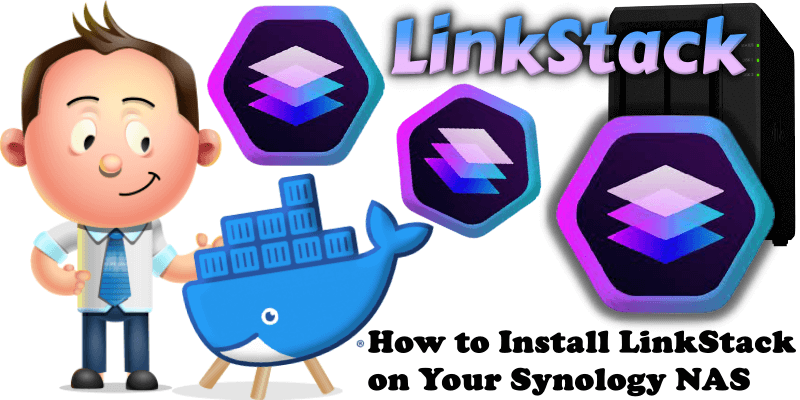
LinkStack is a highly customizable link sharing platform with an intuitive, easy to use user interface. LinkStack offers more features than any other comparable solution out there. In this step by step guide I will show you how to install LinkStack on your Synology NAS with Docker & Portainer.
STEP 1
Please Support My work by Making a Donation.
STEP 2
Install Portainer using my step by step guide. If you already have Portainer installed on your Synology NAS, skip this STEP. Attention: Make sure you have installed the latest Portainer version.
STEP 3
Make sure you have a synology.me Wildcard Certificate. Follow my guide to get a Wildcard Certificate. If you already have a synology.me Wildcard certificate, skip this STEP.
STEP 4
Go to Control Panel / Login Portal / Advanced Tab / click Reverse Proxy. Follow the instructions in the image below.
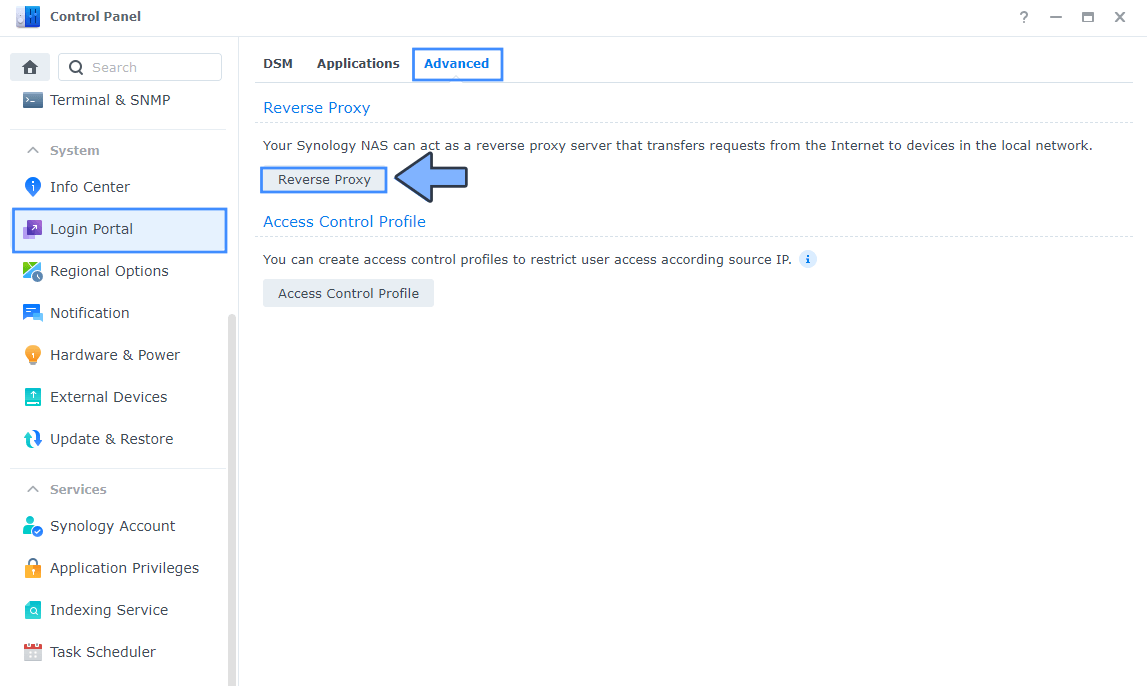
STEP 5
Now click the “Create” button. Follow the instructions in the image below.
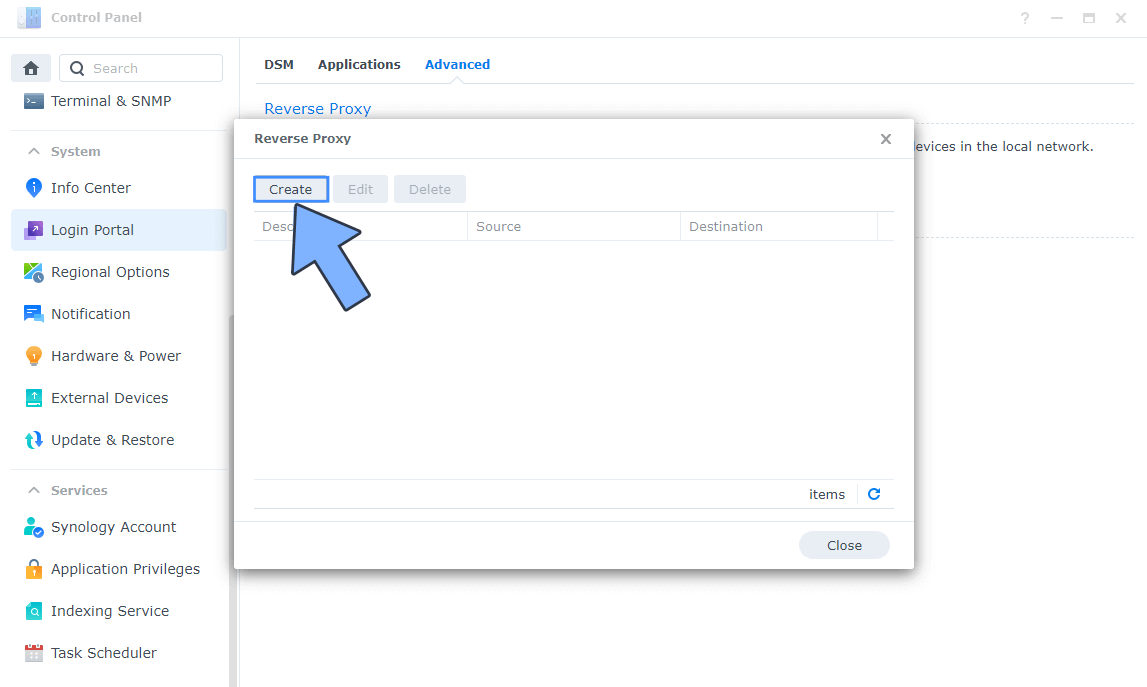
STEP 6
After you click the Create button, the window below will open. Follow the instructions in the image below.
On the General area, set the Reverse Proxy Name description: type in LinkStack. After that, add the following instructions:
Source:
Protocol: HTTPS
Hostname: linkstack.yourname.synology.me
Port: 443
Check Enable HSTS
Destination:
Protocol: HTTPS
Hostname: localhost
Port: 8190
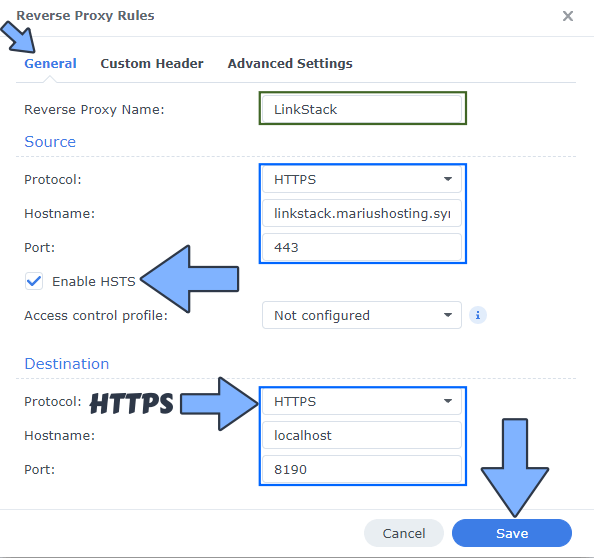
STEP 7
On the Reverse Proxy Rules, click the Custom Header tab. Click Create and then, from the drop-down menu, click WebSocket. After you click on WebSocket, two Header Names and two Values will be automatically added. Click Save. Follow the instructions in the image below.

STEP 8
Go to Control Panel / Network / Connectivity tab/ Check Enable HTTP/2 then click Apply. Follow the instructions in the image below.
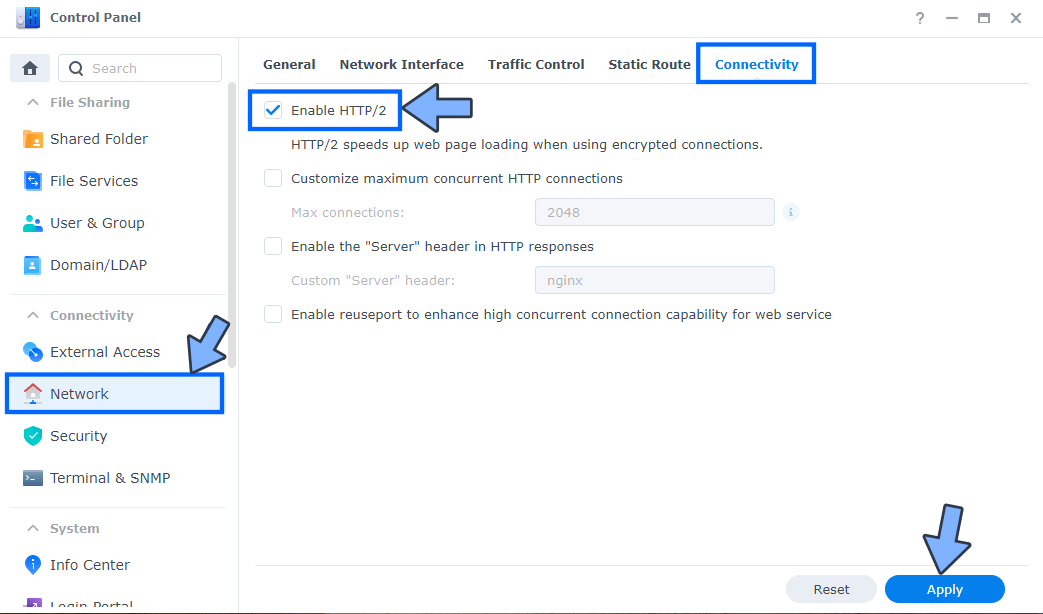
STEP 9
Go to Control Panel / Security / Advanced tab/ Check Enable HTTP Compression then click Apply. Follow the instructions in the image below.
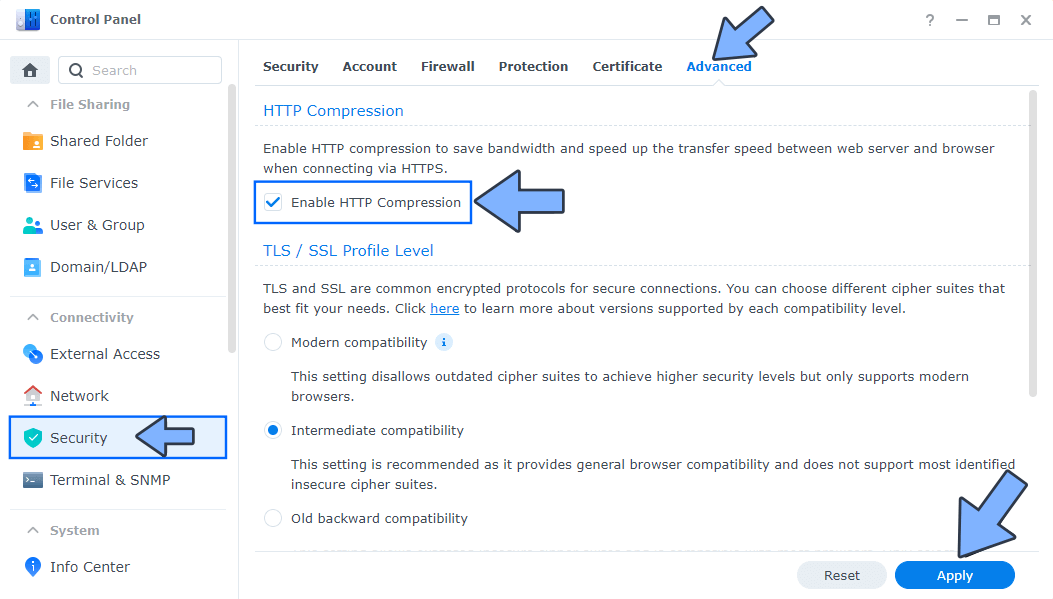
STEP 10
Go to File Station and open the docker folder. Inside the docker folder, create one new folder and name it linkstack. Follow the instructions in the image below.
Note: Be careful to enter only lowercase, not uppercase letters.
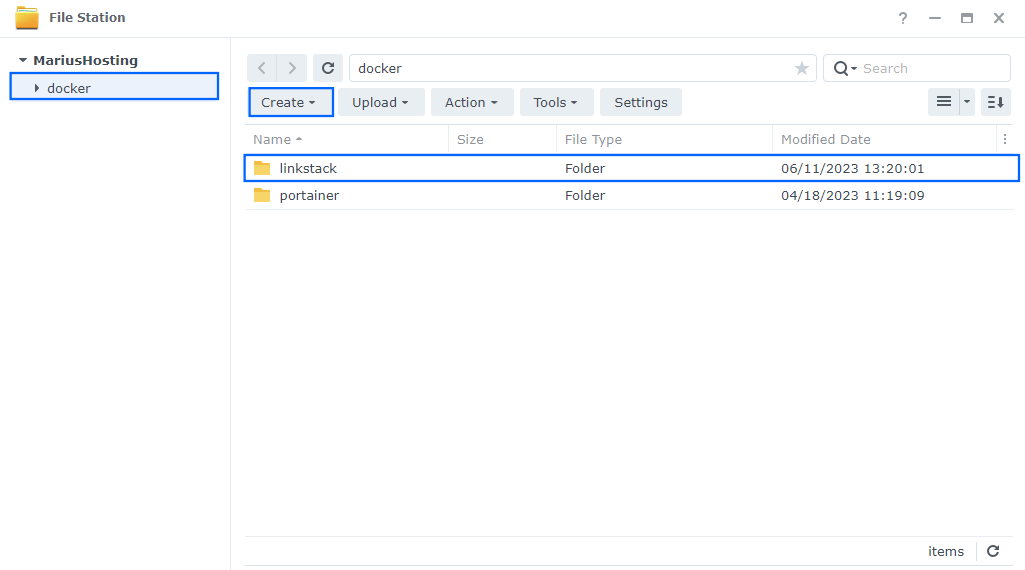
STEP 11
Download (click on the blue link below) and upload the my.cnf file below in the linkstack folder that you have previously created at STEP 10. Follow the instructions in the image below. 🔒Note: Support my work to unlock the password. You can use this password to download any file on mariushosting forever!
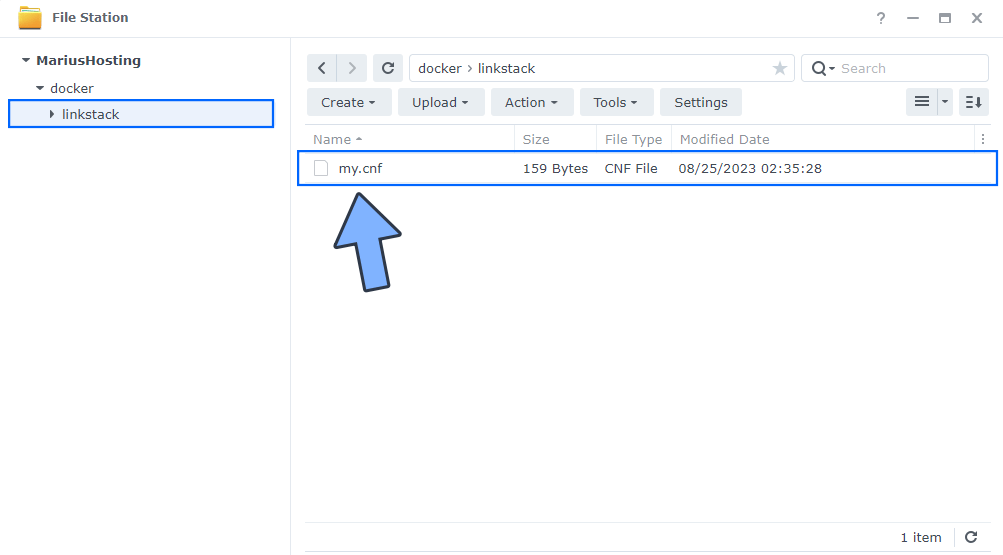
STEP 12
Log into Portainer using your username and password. On the left sidebar in Portainer, click on Home then Live connect. Follow the instructions in the image below.

On the left sidebar in Portainer, click on Stacks then + Add stack. Follow the instructions in the image below.

STEP 13
In the Name field type in linkstack. Follow the instructions in the image below.
services:
db:
image: mariadb:11.8-noble #LTS Long Time Support Until October 15, 2033.
container_name: LinkStack-DB
hostname: linkstack-db
security_opt:
- no-new-privileges:false
volumes:
- /volume1/docker/linkstack:/var/lib/mysql:rw
- /volume1/docker/linkstack:/etc/mysql/conf.d:rw
environment:
TZ: Europe/Bucharest
MYSQL_ROOT_PASSWORD: rootpass
MYSQL_DATABASE: linkstack
MYSQL_USER: linkstackuser
MYSQL_PASSWORD: linkstackpass
restart: on-failure:5
linkstack:
image: linkstackorg/linkstack:latest
container_name: LinkStack
hostname: linkstack
security_opt:
- no-new-privileges:true
ports:
- 8190:443
volumes:
- linkstack_data:/htdocs
environment:
APP_DEBUG: false
APP_ENV: local
TZ: Europe/Bucharest
LOG_LEVEL: info
PHP_MEMORY_LIMIT: 256M
UPLOAD_MAX_FILESIZE: 8M
DB_CONNECTION: mysql
DB_HOST: linkstack-db
DB_PORT: 3306
DB_DATABASE: linkstack
DB_USERNAME: linkstackuser
DB_PASSWORD: linkstackpass
restart: on-failure:5
depends_on:
db:
condition: service_started
volumes:
linkstack_data:
Note: Before you paste the code above in the Web editor area below, change the value for TZ. (Select your current Time Zone from this list.)
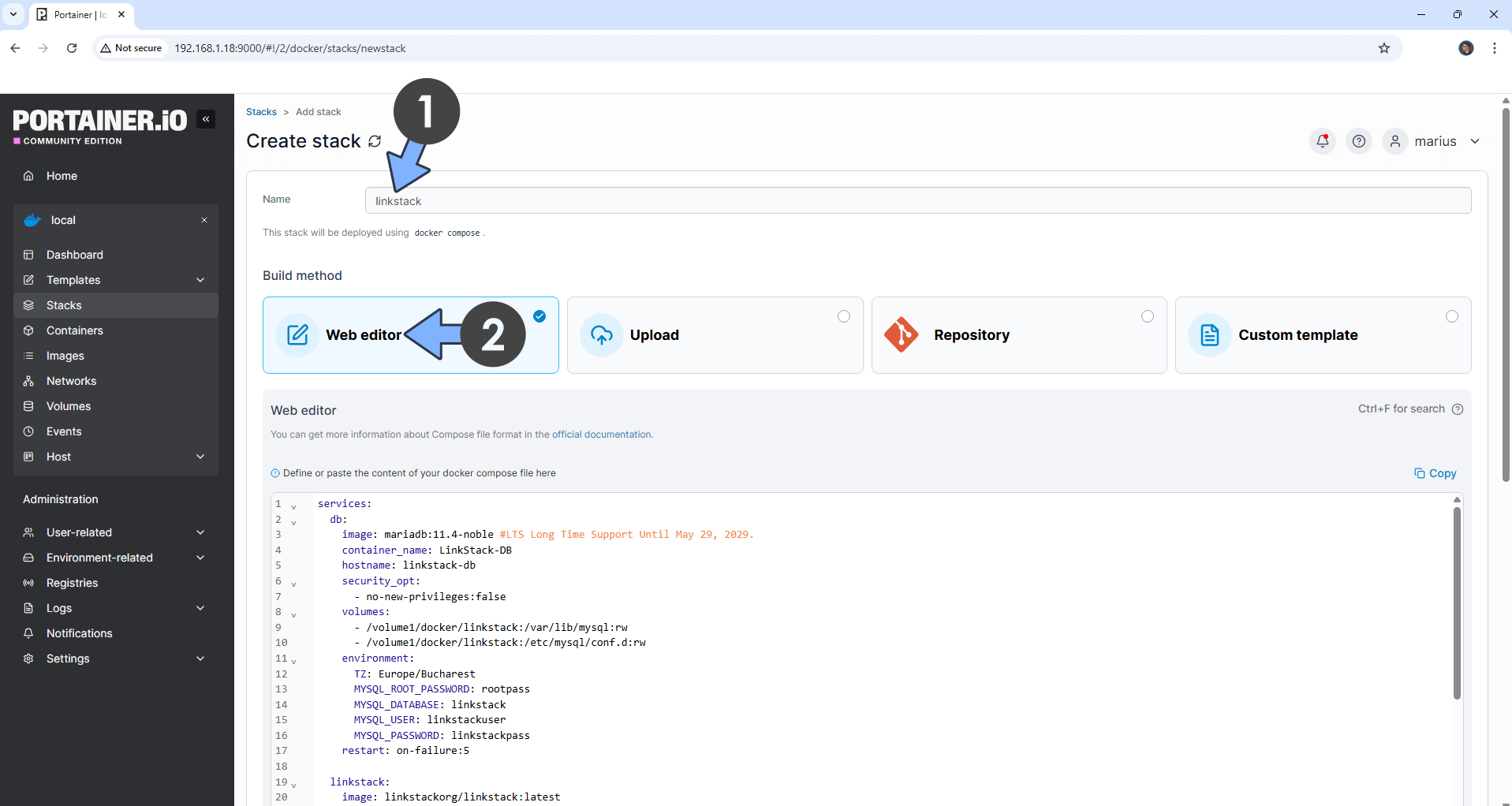
STEP 14
Scroll down on the page until you see a button named Deploy the stack. Click on it. Follow the instructions in the image below. The installation process can take up to a few minutes. It will depend on your Internet speed connection.
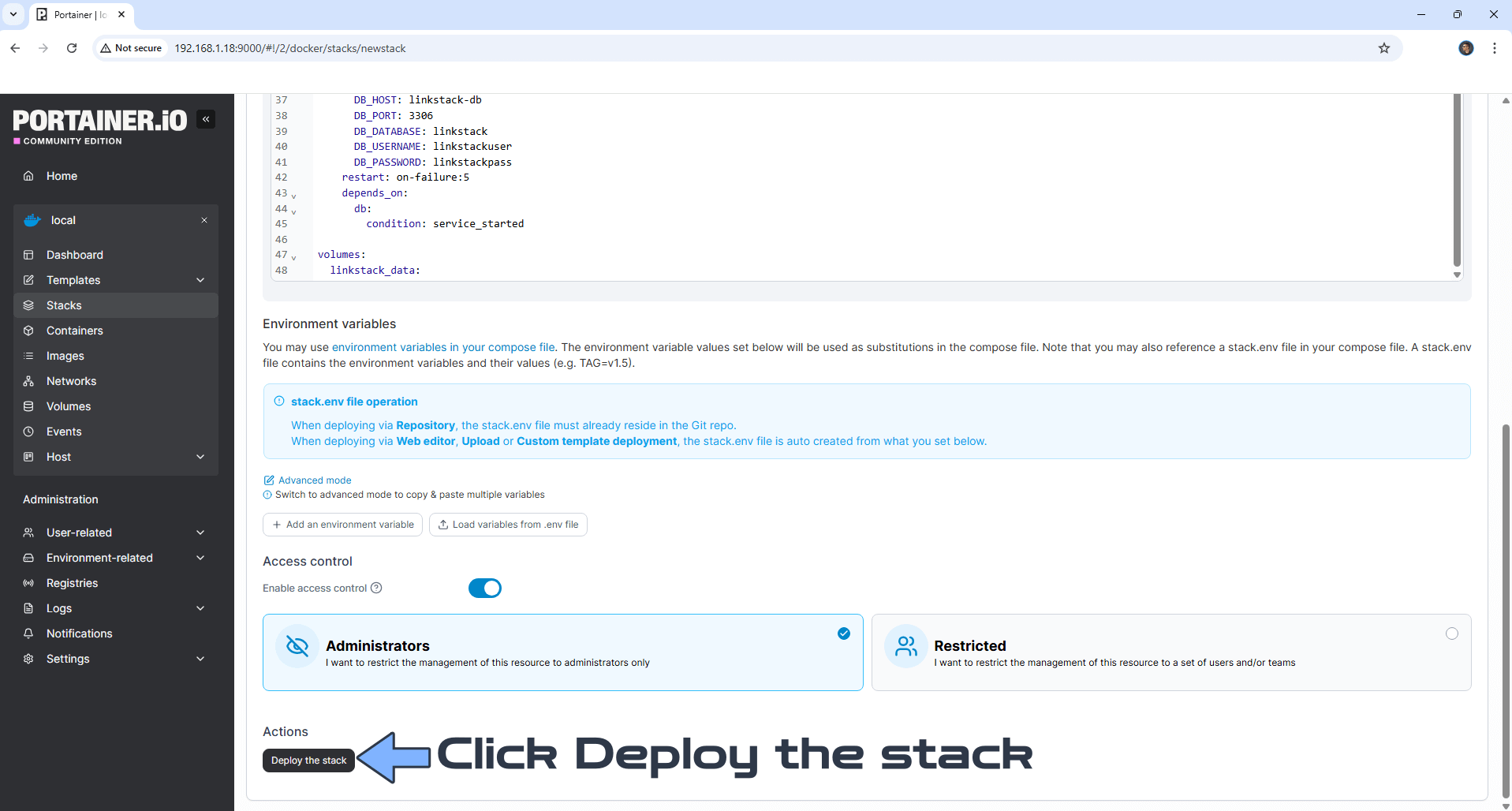
STEP 15
If everything goes right, you will see the following message at the top right of your screen: “Success Stack successfully deployed“.

STEP 16
On the left sidebar in Portainer, click Containers. Identify your LinkStack instance, then click on the little terminal icon. Follow the instructions in the image below.
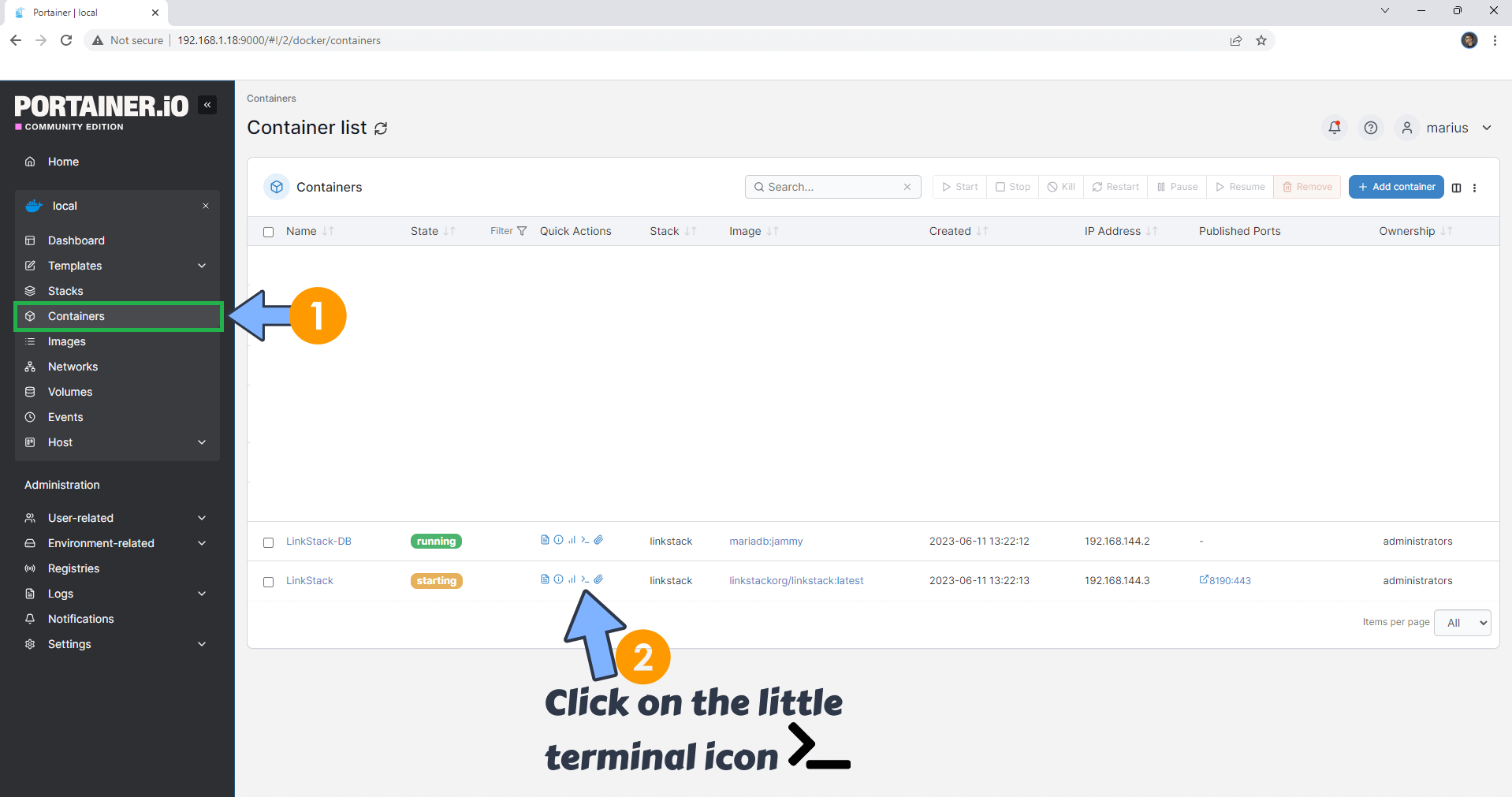
STEP 17
After you click on the little terminal icon at STEP 16, a new page will open. From the dropdown Command menu, select /bin/ash then click Connect. Follow the instructions in the image below.
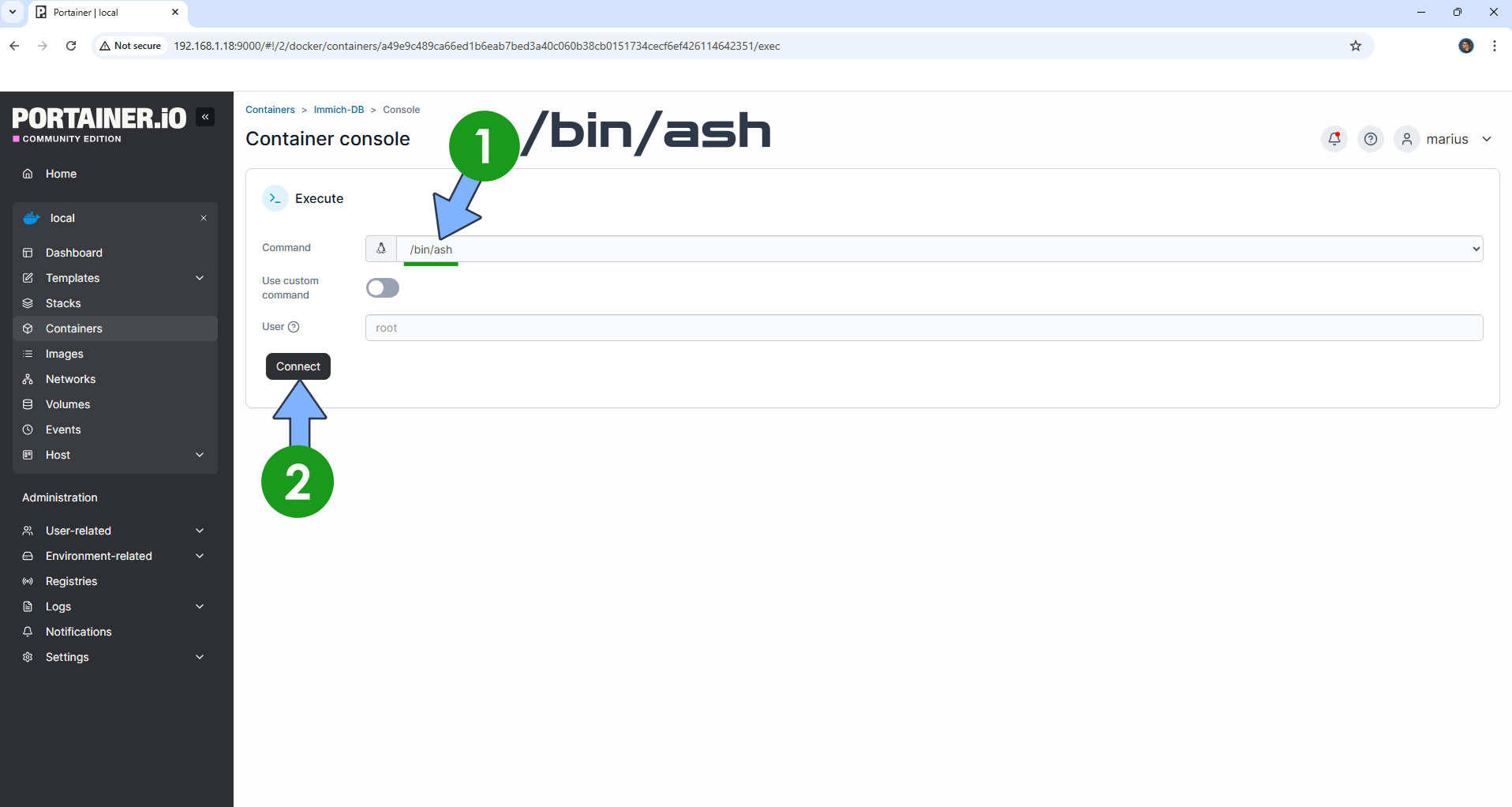
STEP 18
After you click Connect at STEP 17, a Console will open. Copy paste the code below and confirm by pressing Enter on your keyboard to start the admin rights process. Follow the instructions in the image below.
php82 artisan migrate
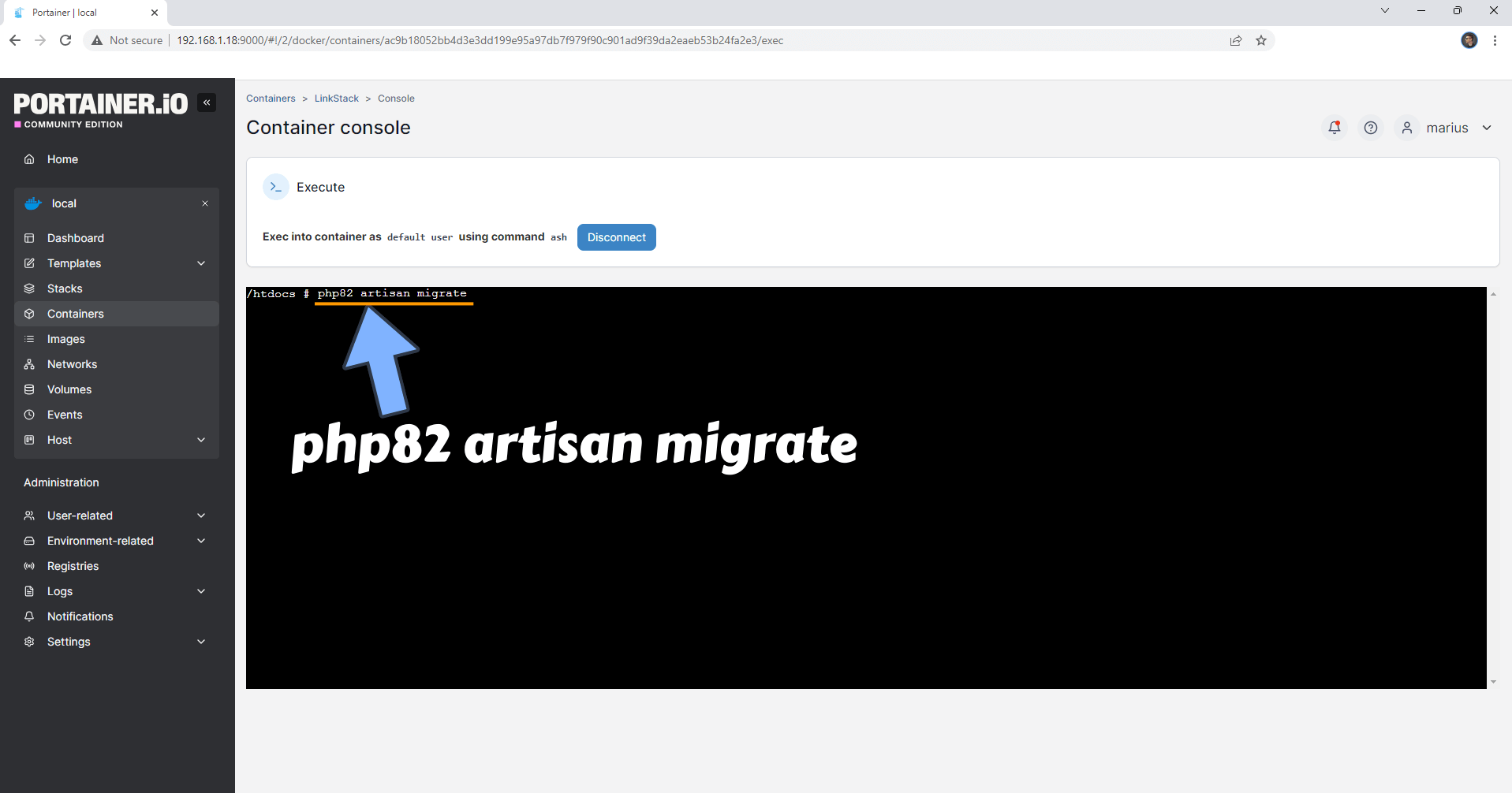
STEP 19
After you click Enter on your Keyboard at STEP 18, wait until the database migration table is created. Follow the instructions in the image below.
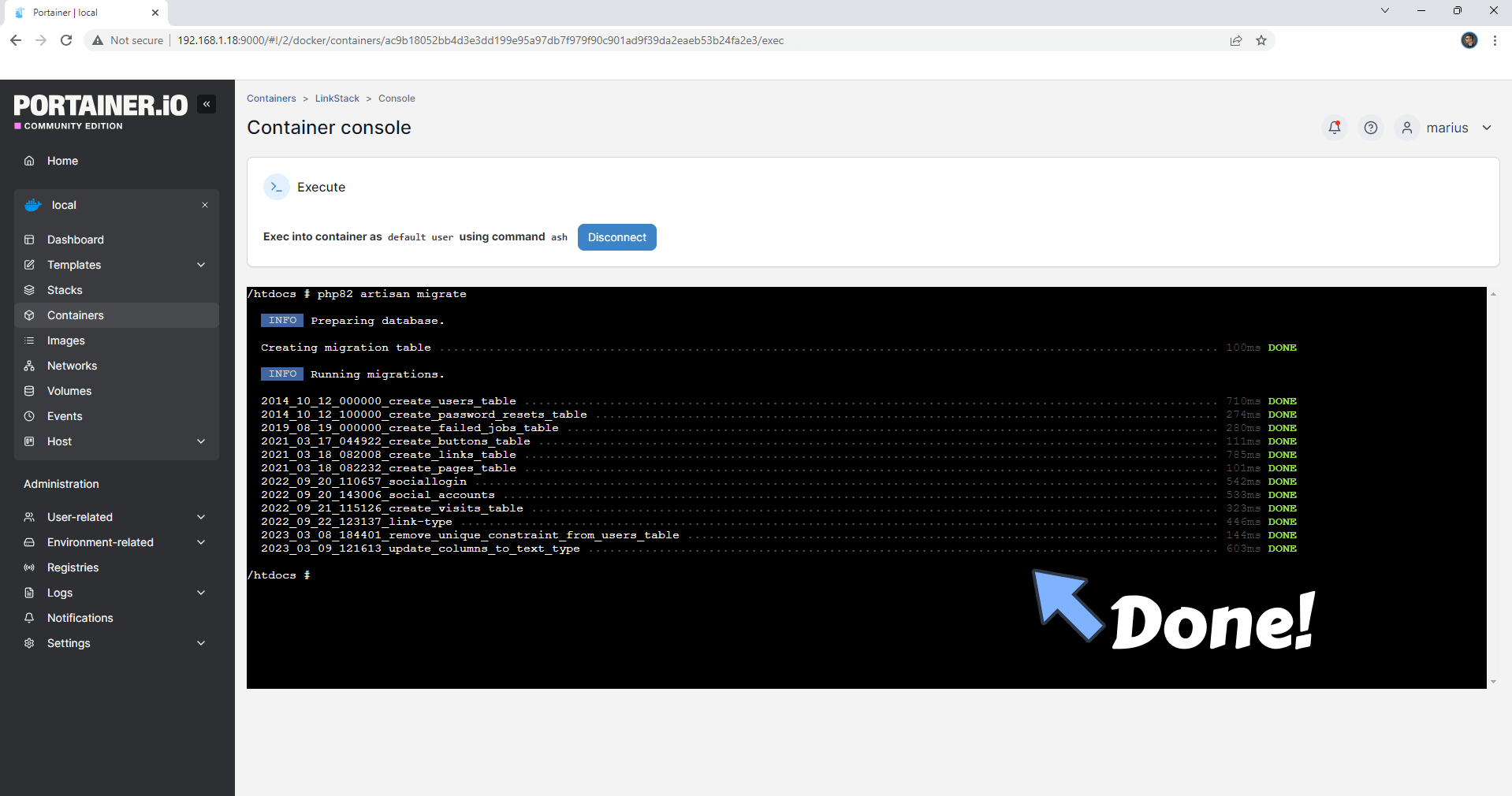
STEP 20
🟢Please Support My work by Making a Donation. Almost 99,9% of the people that install something using my guides forget to support my work, or just ignore STEP 1. I’ve been very honest about this aspect of my work since the beginning: I don’t run any ADS, I don’t require subscriptions, paid or otherwise, I don’t collect IPs, emails, and I don’t have any referral links from Amazon or other merchants. I also don’t have any POP-UPs or COOKIES. I have repeatedly been told over the years how much I have contributed to the community. It’s something I love doing and have been honest about my passion since the beginning. But I also Need The Community to Support me Back to be able to continue doing this work.
STEP 21
Now open your browser and type in your HTTPS/SSL certificate like this https://linkstack.yourname.synology.me that you have previously created at STEP 6. In my case it’s https://linkstack.mariushosting.synology.me If everything goes right, you will see the LinkStack Setup page. Choose a language then click Next. Follow the instructions in the image below.
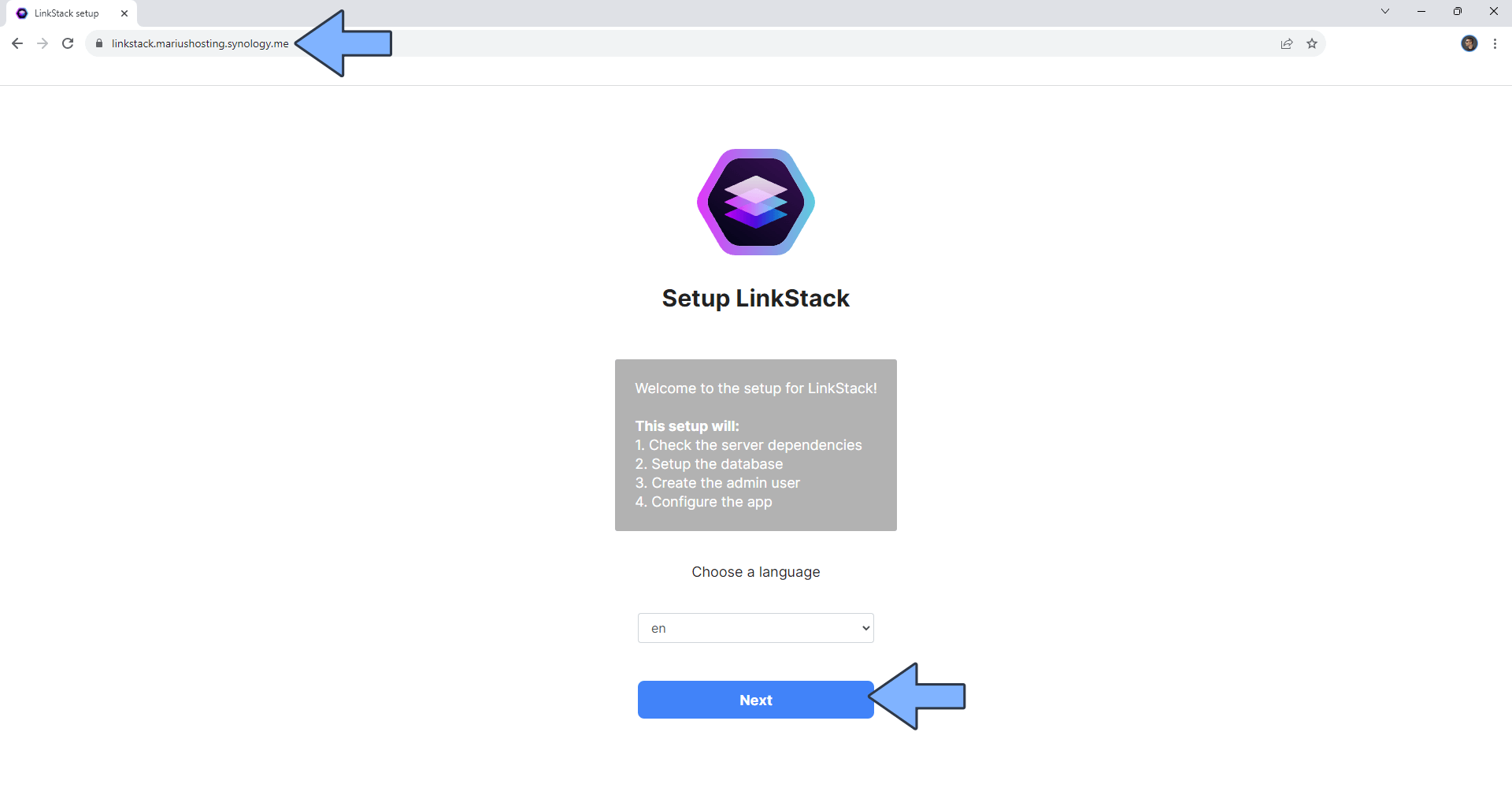
STEP 22
Click Next. Follow the instructions in the image below.
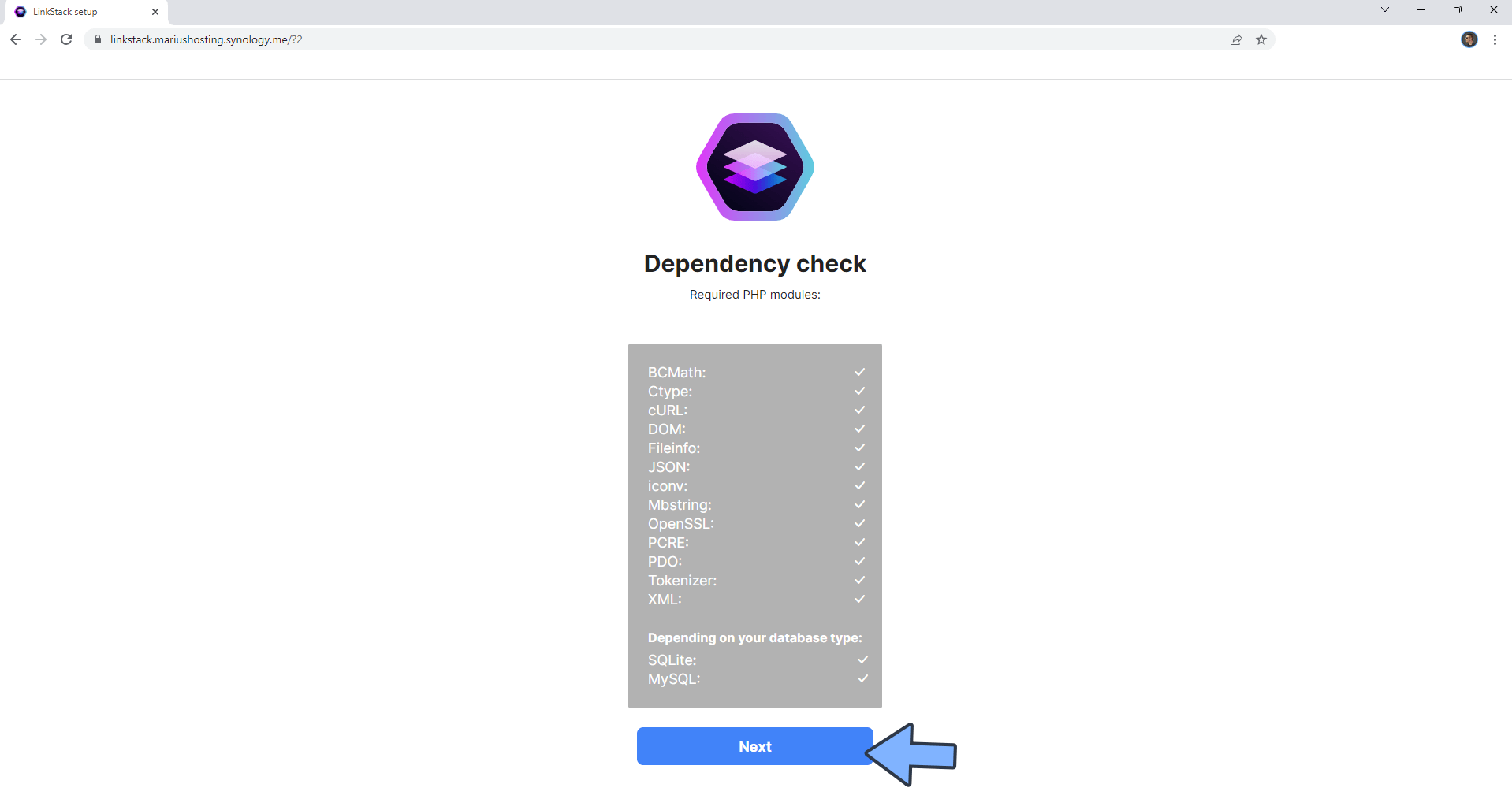
STEP 23
From the dropdown menu, select MySQL as the database, then click Next. Follow the instructions in the image below.
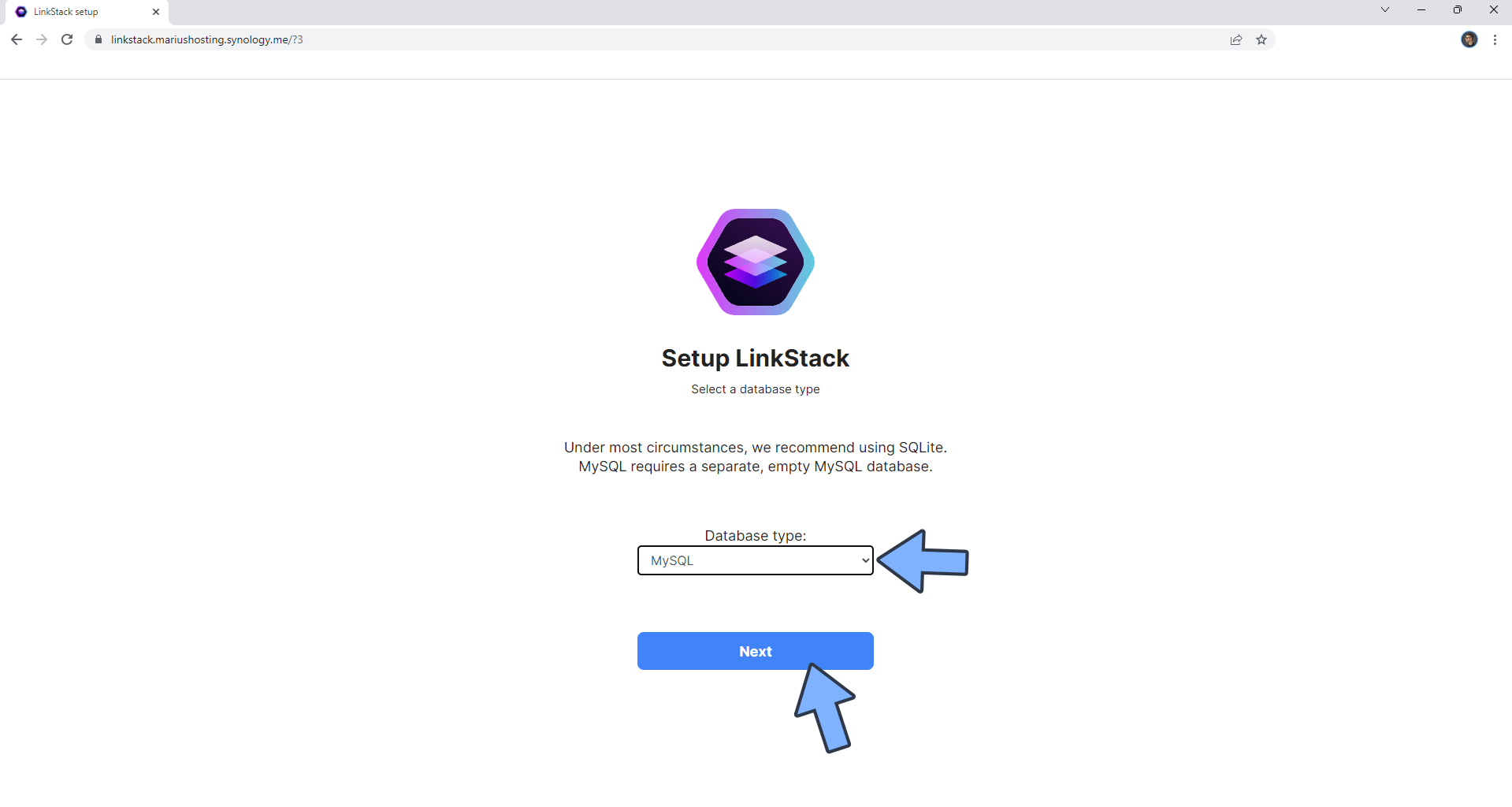
STEP 24
Add the database details then click Next. Follow the instructions in the image below.
Database host: linkstack-db
Database port: 3306
Database name: linkstack
Database username: linkstackuser
Database password: linkstackpass
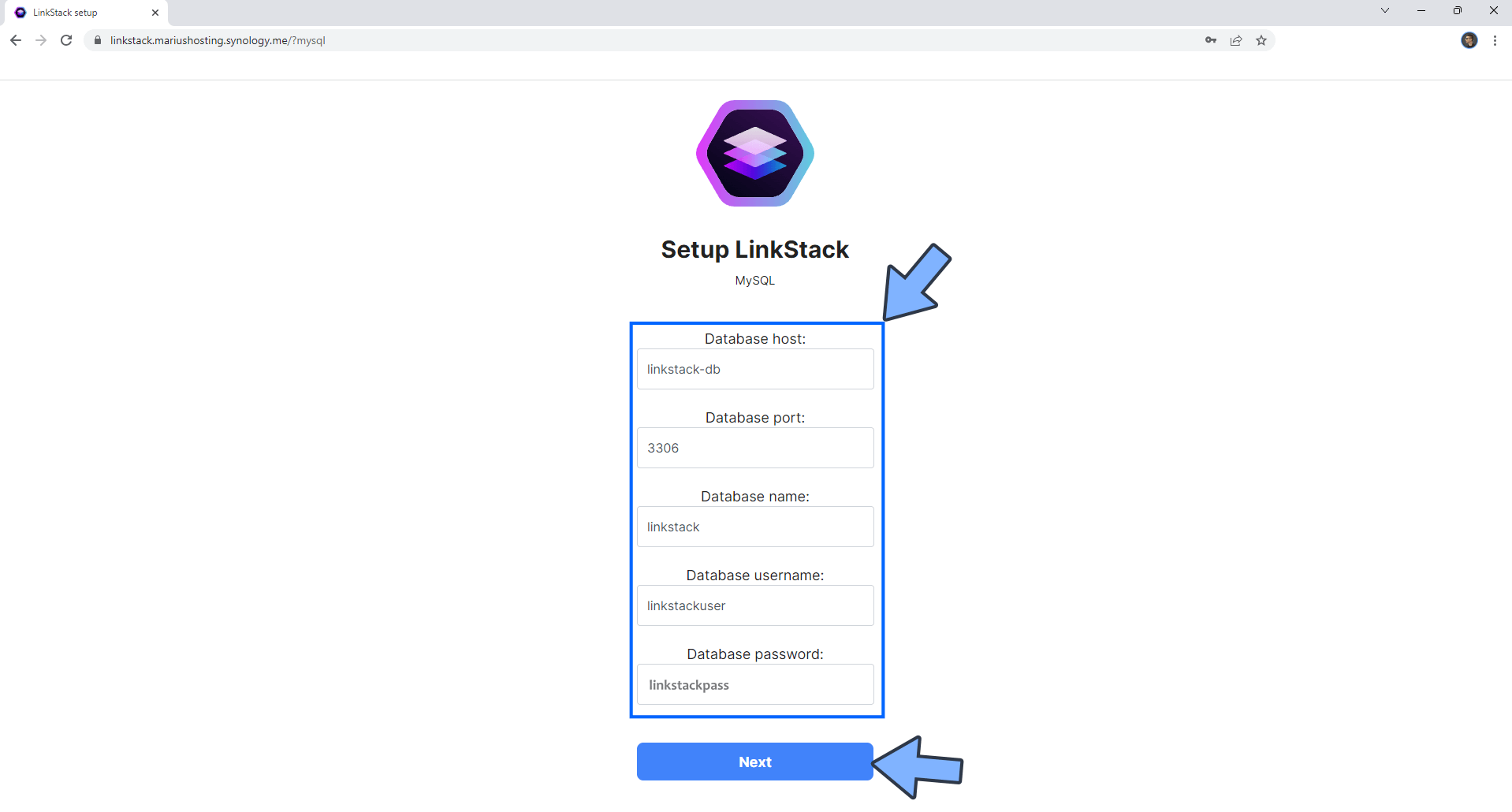
STEP 25
Type in your own administrator Email and Password. Select a Handle name then type in your Name. Click Next. Follow the instructions in the image below.
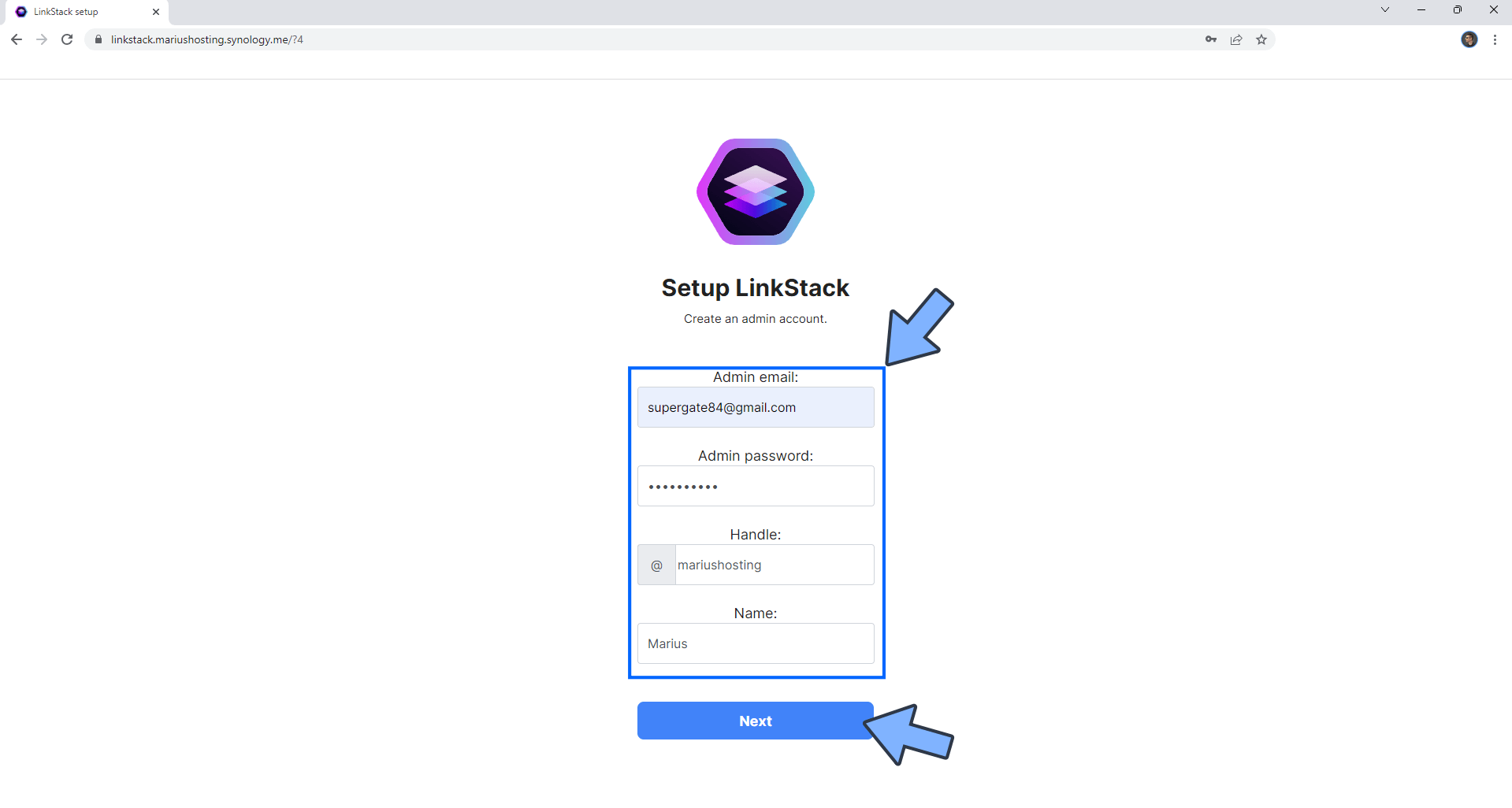
STEP 26
Enable or disable new user registration. Give a name to your app then click Finish setup. Follow the instructions in the image below.
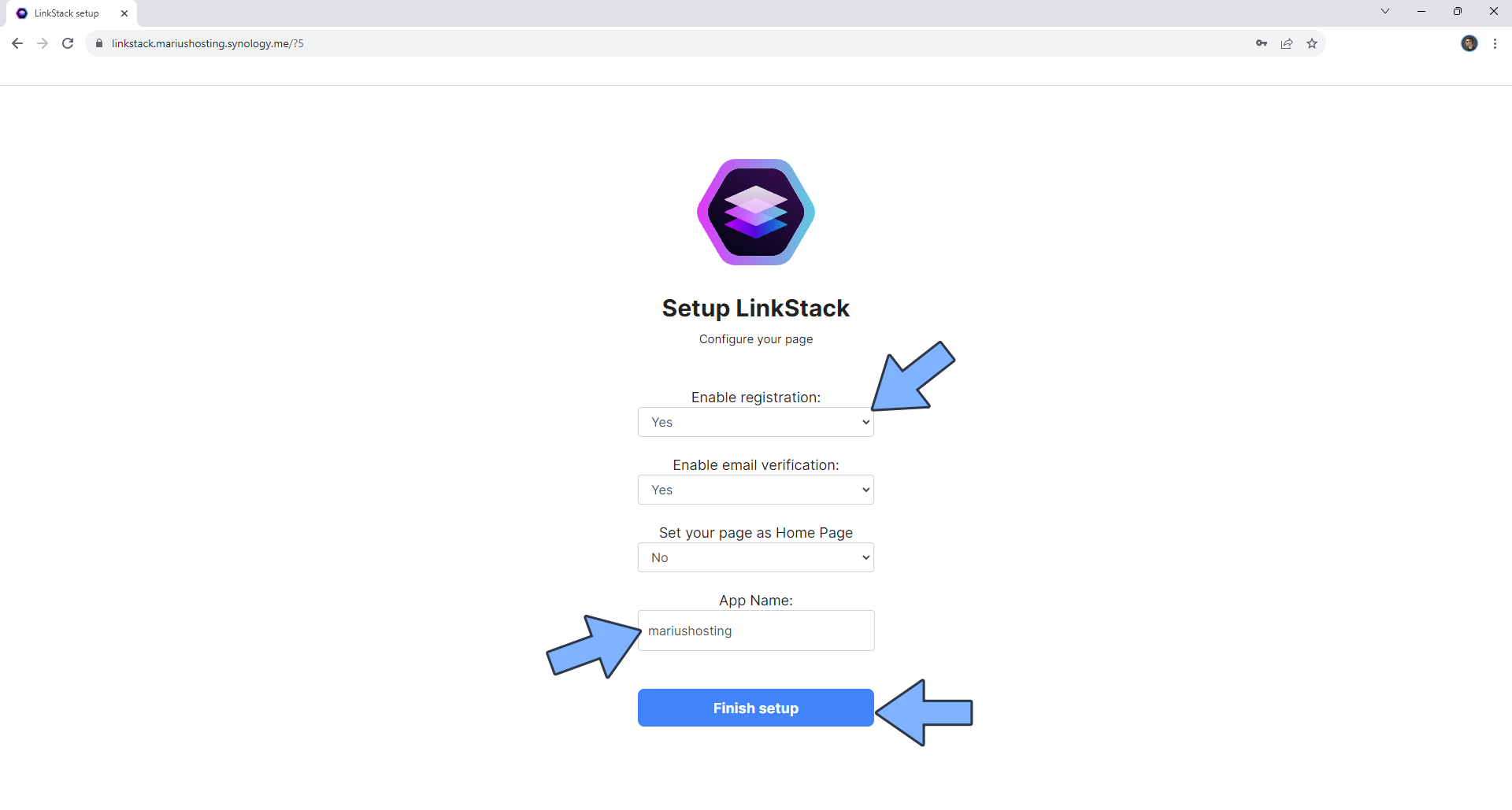
STEP 27
Click Log in. Follow the instructions in the image below.
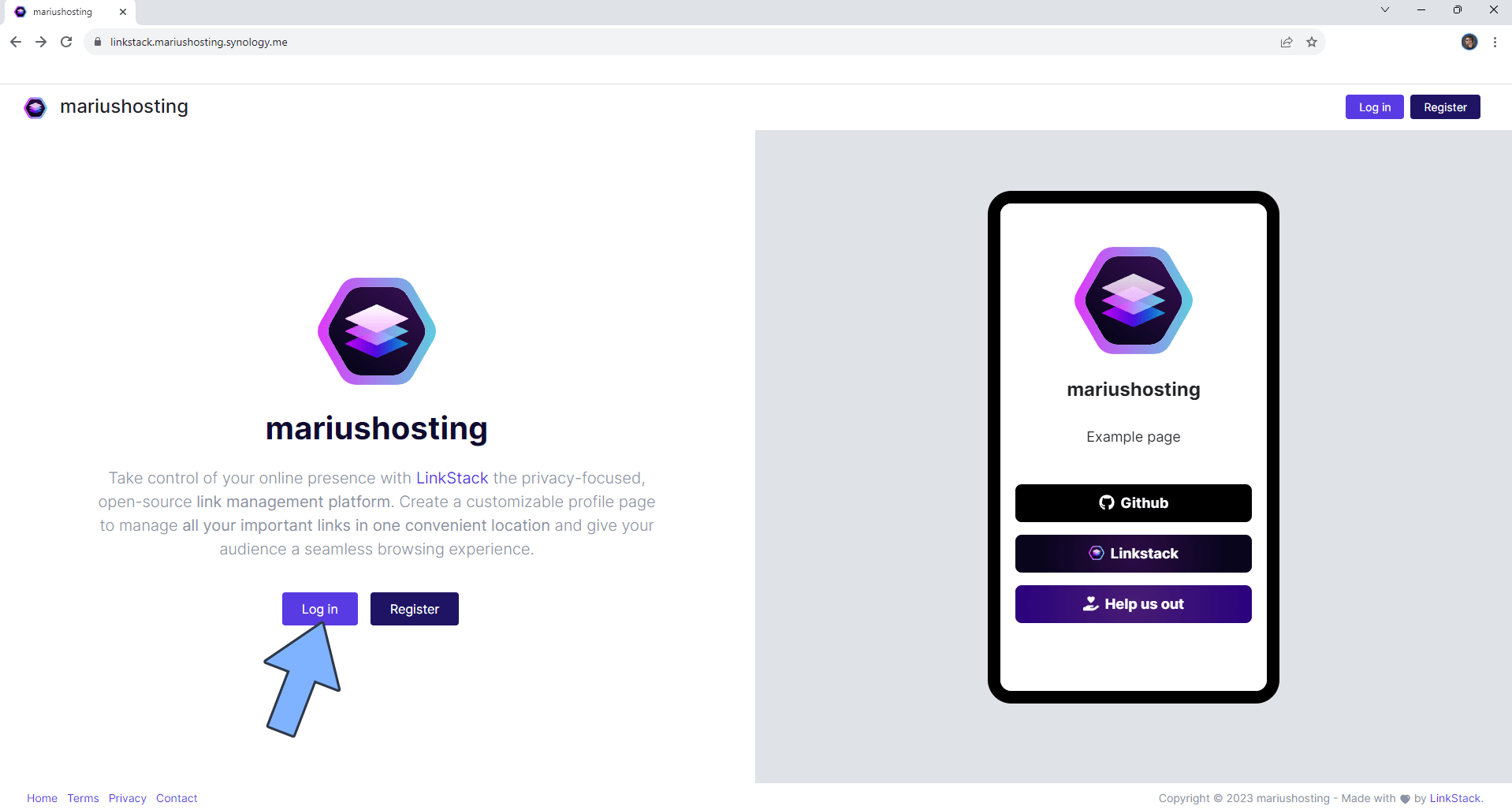
STEP 28
Type in your own Email and Password that you have previously created at STEP 25 then click Sign In. Follow the instructions in the image below.
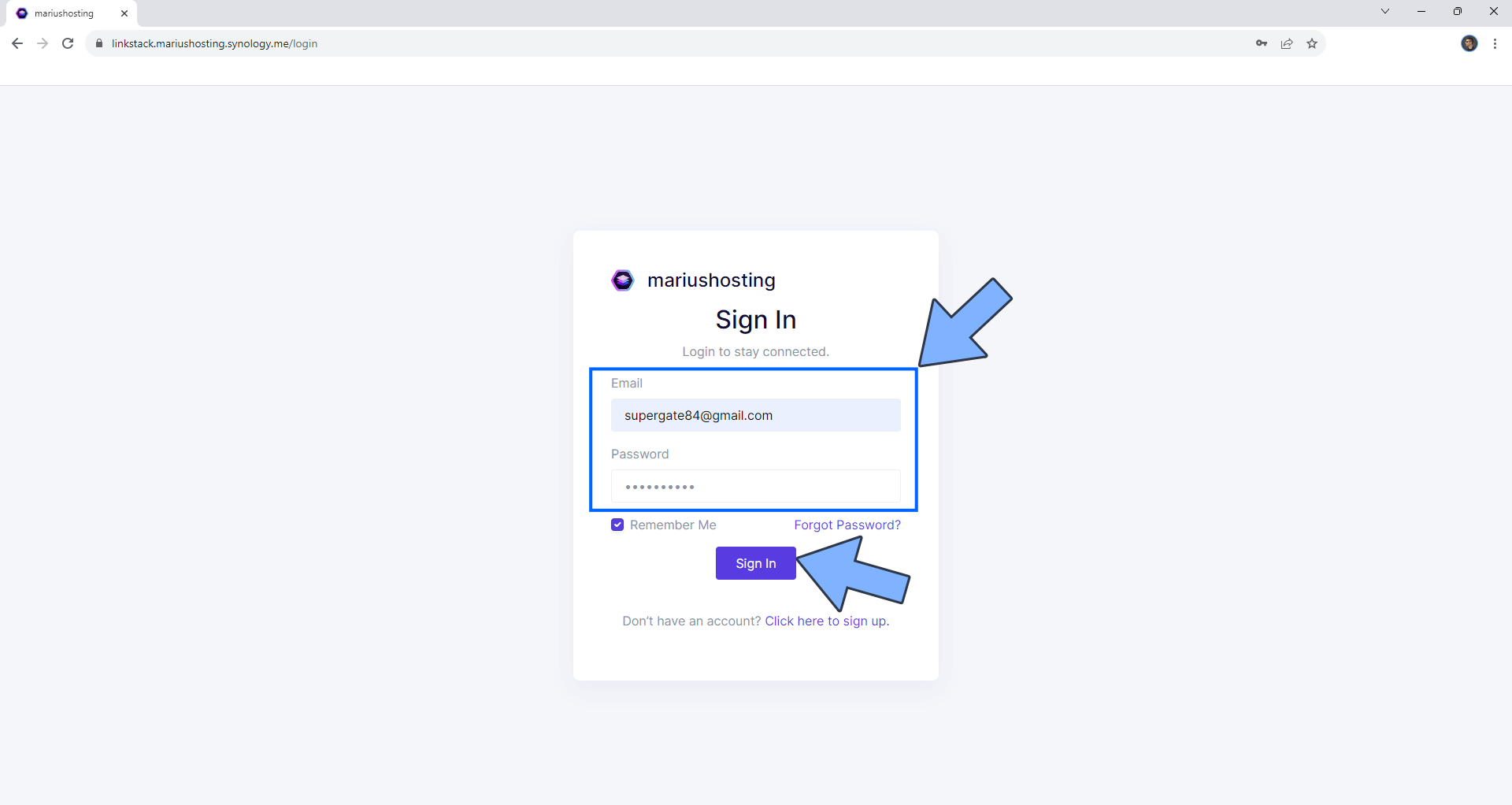
STEP 29
Your LinkStack dashboard at a glance! Go to the next STEP.
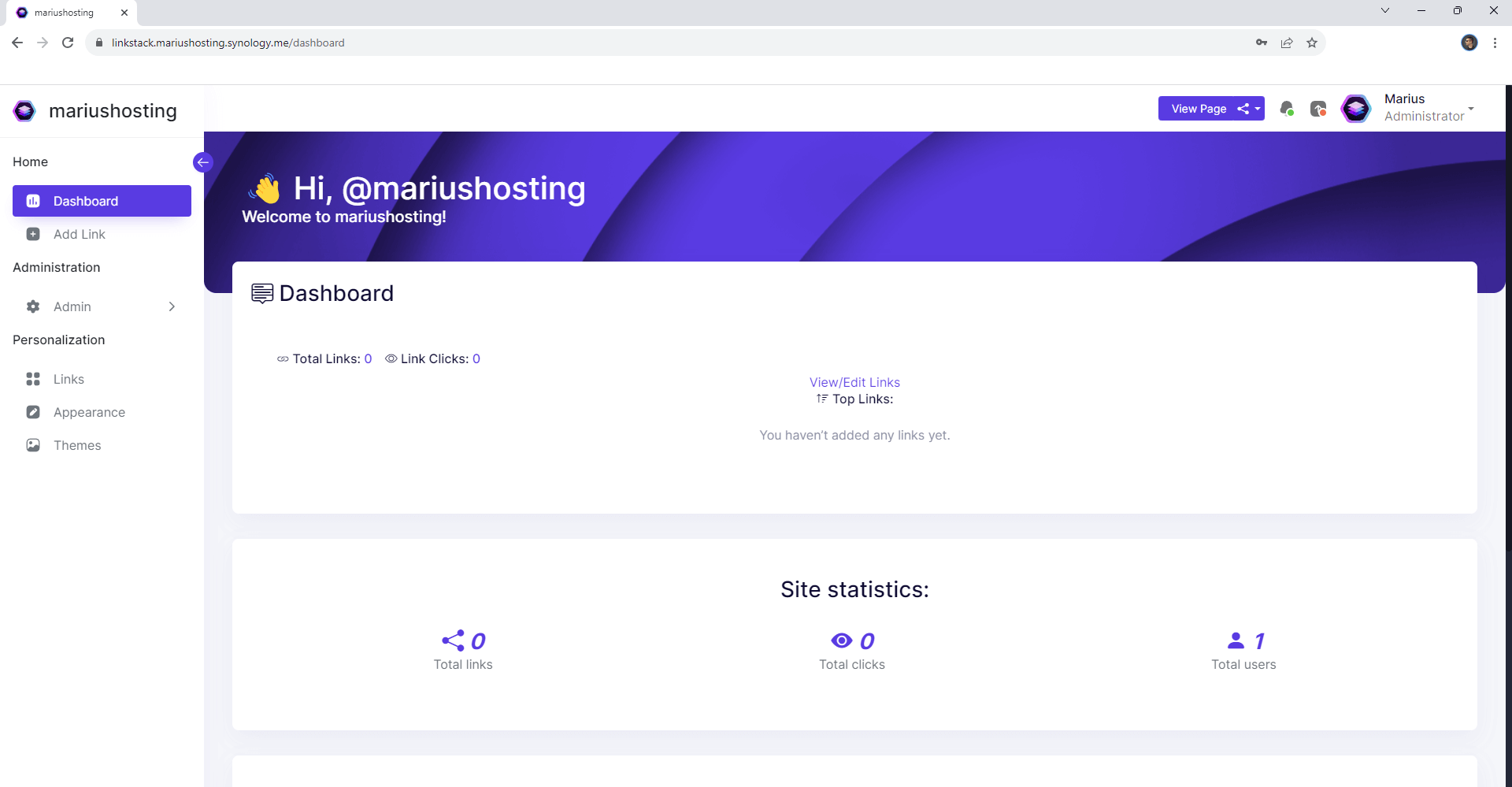
STEP 30
On the left sidebar click Admin then Config. Enable “Force links HTTPS“. Follow the instructions in the image below.
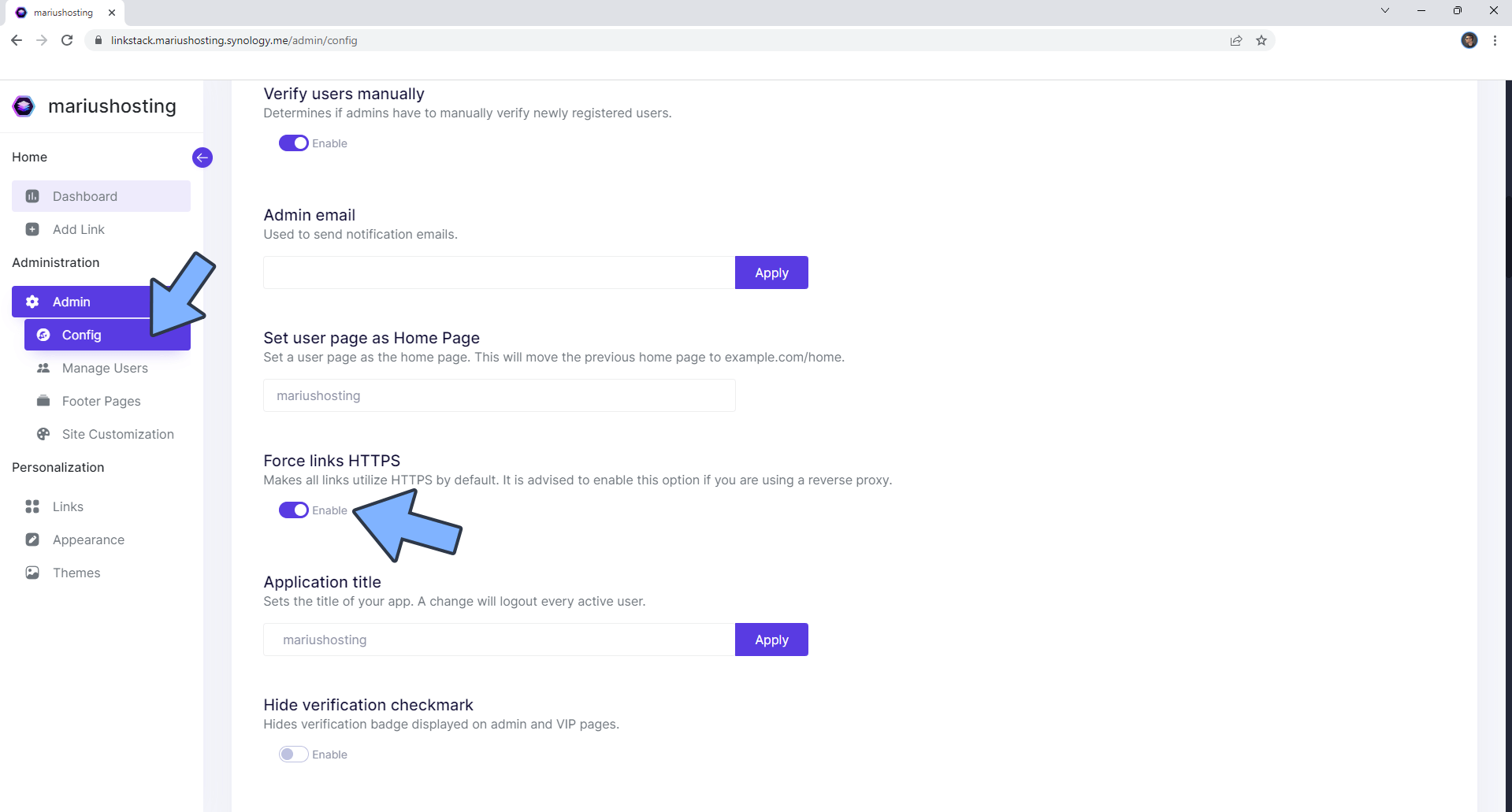
STEP 31
Start adding your personal links. Follow the instructions in the image below.
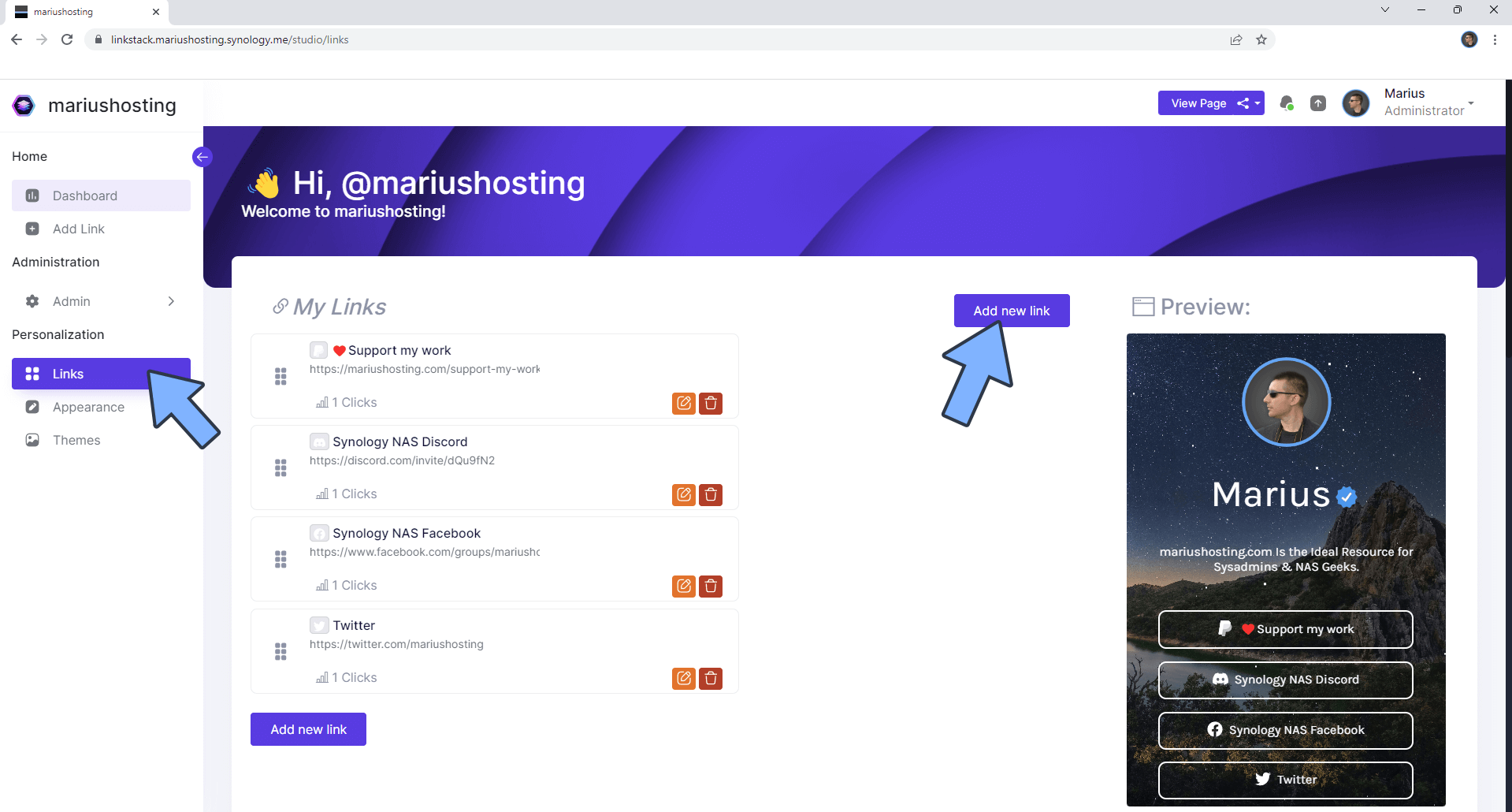
STEP 32
Your LinkStack page at a glance!
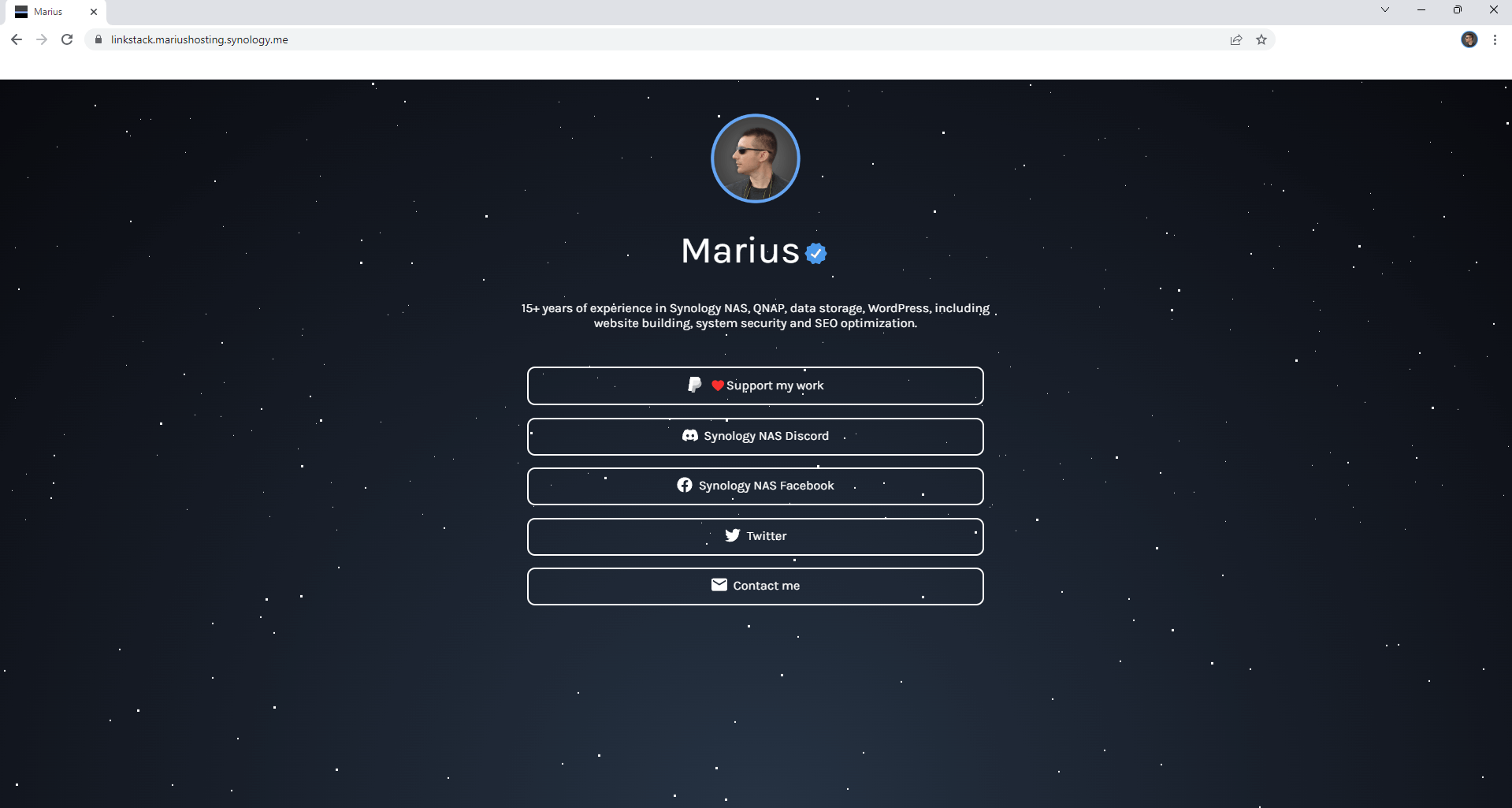
Enjoy LinkStack!
If you encounter issues by using this container, make sure to check out the Common Docker issues article.
Note: Can I run Docker on my Synology NAS? See the supported models.
Note: How to Back Up Docker Containers on your Synology NAS.
Note: Find out how to update the LinkStack container with the latest image.
Note: How to Free Disk Space on Your NAS if You Run Docker.
Note: How to Schedule Start & Stop For Docker Containers.
Note: How to Activate Email Notifications.
Note: How to Add Access Control Profile on Your NAS.
Note: How to Change Docker Containers Restart Policy.
Note: How to Use Docker Containers With VPN.
Note: Convert Docker Run Into Docker Compose.
Note: How to Clean Docker.
Note: How to Clean Docker Automatically.
Note: Best Practices When Using Docker and DDNS.
Note: Some Docker Containers Need WebSocket.
Note: Find out the Best NAS Models For Docker.
Note: Activate Gmail SMTP For Docker Containers.
This post was updated on Thursday / February 5th, 2026 at 5:24 PM
